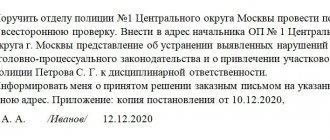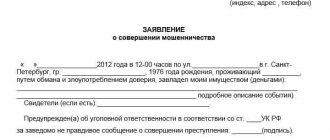The work of the district police officer is aimed at resolving conflict situations that arise between neighbors, resolving or counteracting crimes. Many people consider district police officers to be the lowest level in law enforcement agencies, but in most cases it is with them that citizens have to come into contact.
Due to the fact that the position of a district police officer is the starting point when working in the police, few people agree to carry out the duties assigned to the district police officer. This leads to the fact that a large number of employees working as district police officers perform their duties in bad faith and do not respond to requests from citizens living in their assigned area. In this case, the question arises: “Where to complain about the local police officer” and “How to properly file a complaint.” These are the questions we will try to answer.
Multi-channel free hotline Legal advice on criminal law. Every day from 9.00 to 21.00
Moscow and region: +7 (495) 662-44-36
St. Petersburg: +7 (812) 449-43-40
What may serve as a basis for a complaint?
There are cases when a citizen writes a complaint against his local police officer, but he receives nothing in response. Such actions are considered a violation by law enforcement.
If a local police officer takes illegal actions or does nothing at all in relation to citizens who filed an application, this will constitute a failure to fulfill his obligations.
After no action has taken place on the part of the local police officer, the citizen may give up, or may write a complaint against him. Before filing a police report, you should consult a legal specialist. Having learned your problem, he will tell you what rights were violated, how to file a complaint and what to expect from such proceedings.
What are the responsibilities of a local police officer?
Before considering the duties of a district police officer, it is necessary to understand what official duties are assigned to him. According to the terminology, a precinct officer is an official whose duties include protecting the rights of citizens living in the area assigned to him. It is also worth understanding that its possibilities are not limitless and if you have witnessed a serious crime, it is better to contact the police department with a written statement.
Now that we have found out who a district police officer is, we should consider his main job responsibilities . These include:
- Ensuring the safety of citizens in the residential area;
- Monitoring the observance of public order;
- Combating administrative violations;
- Investigation of crimes committed and search for criminals;
- Providing the necessary assistance to citizens, according to existing powers.
As for the consideration of the appeal sent to the district police officer, it must be accepted for consideration and a response must be given. If the authority does not allow you to respond to the appeal, then it is redirected to an official who has the appropriate authority. The applicant must be informed about the redirection of the application.
It is also worth being aware of the fact that the powers of the district police officer are strictly limited, and he cannot bring the offender to justice on his own. To do this, it is necessary to collect all the necessary materials, draw up a protocol on the administrative offense and transfer the papers to the responsible person.
If a citizen contacts a local police officer regarding a serious crime, the commission of which faces criminal liability, then his duties include initiating a criminal case into the commission of the crime.
As we have already said, the district police officer cannot always impose sanctions on the violator, but in some cases this is still possible. The Code of Administrative Offenses contains a list of violations for which a district police officer can be held accountable. Such violations include smoking in public places, drinking alcoholic beverages in public places, and driving without a license or registration plates.
We should not forget that there are strictly established deadlines within which the appeal must be considered and a response must be given. You can find out about the deadlines in Article No. 12 of Federal Law No. 59. According to this article, the district police officer is obliged to consider the citizen’s appeal within 30 days. In some cases, an increase in this period is allowed, but there must be compelling reasons for this.
Where to complain?
If you decide to file a complaint against a local police officer, then first determine the local police officer’s place of work and write a complaint addressed to his boss. In most cases, such complaints are resolved positively in favor of the complainant.
Attention! If the head of the unit takes the side of his employee, then you need to contact the following higher authorities: the court or the prosecutor's office.
They go to court when there is confirmation and evidence of violations by a law enforcement officer, as well as evidence that moral or material damage has been caused. They draw up a statement of claim and, if necessary, can use the services of a lawyer.
Download a sample complaint against a local police officer
If, after a trial, the district police officer is found guilty, he will face administrative or criminal punishment. Having evidence that the local police officer caused damage, submit an application immediately; there is no need to postpone such a case.
When the actions of the local police officer are not legal or the police officer does nothing at all when you contact him with your problem, then you should contact the prosecutor’s office. After such a complaint, the district police officer’s workplace will undergo an unscheduled inspection. If the inaction or illegal actions of the district police officer are confirmed, the guilty person will bear administrative liability. To quickly resolve the problem with the local police officer, file a complaint with all organizations at once, this way the problem will be resolved much faster.
Main responsibilities of a district police officer in 2019
What responsibilities are assigned to the local police commissioner? Today, all activities of local police officers in the Russian Federation are regulated by Order of the Ministry of Internal Affairs of Russia dated December 31, 2012 N 1166.
In accordance with the provisions of this order, each district police officer is obliged to:
Identify persons illegally purchasing, storing and transporting drugs;
Identify people who use drugs without a doctor’s prescription;
Identify minors living in inappropriate conditions;
Identify dens for prostitution or illegal drug use;
Confiscate from citizens and officials items with limited negotiability and items withdrawn from civil circulation (for example, weapons or counterfeit documents);
Monitor persons suffering from mental disorders, alcoholism or drug addiction and posing a danger to others;
Exercise control over persons released from prison;
To bypass places of possible appearance of persons prone to committing illegal actions;
Assist health workers in compulsory hospitalization of the above-mentioned persons in medical organizations (if such hospitalization was ordered by the court);
Receive statements from citizens about crimes and incidents;
Take measures to suppress the activities of these persons;
Identify their organizers and take measures to suppress their activities;
Participate in the arrest of persons suspected of committing a crime;
Participate in counter-terrorism activities;
Participate in the suppression of crimes and other offenses;
Participate in the prevention of neglect and juvenile delinquency;
Participate in the search for children who left home without permission, etc.
Features of filing a complaint
Such a document must be drawn up correctly, without any errors. If you are not confident in your abilities, you can seek help from a lawyer. The more correctly a complaint against a local police officer is drawn up, the more seriously it will be taken.
If a complaint is written to the prosecutor’s office or to the head of a department, there is no special form. When a statement of claim is drawn up against a local police officer, you will need the Code of Civil Procedure of the Russian Federation.
Basic rules for filing a complaint:
- There should be no corrections. The pen is used only one color, the handwriting must be legible.
- The complaint is presented in a business style.
- The text should not contain insults or profanity. Everything must be subjective.
- Any fact stated in the complaint is confirmed by the law.
- The information part of the complaint should not contain unnecessary and useless information. Everything is presented only based on facts that have evidence.
The complaint is written in two copies, one is kept for yourself, and the second is sent to the relevant authorities.
Important! When you give your complaint to the police, ask them to sign and date your copy. This will be confirmation that it has been received and passed on to higher management.
The complaint submitted must have:
- name of the organization or full name of the boss, position, details.
- personal data, place of registration of the applicant.
- the name, in this case, is Complaint about the inaction of the local police officer.
- description of the problem, confirmed by law.
- requirements presented to a local police officer who did not react according to the law or did nothing at all.
The form of the complaint can be free or according to the established template. After filing a complaint with the appropriate authority, it will be considered no more than 30 days.
Where to complain about a local police officer
Depending on the severity of the actions (or inactions) committed by the local inspector, there are three structures where it is recommended to send complaints.
To the boss
Each district police officer has an immediate supervisor, whose name and position can be found on the police website, or you can find out from the police officer on duty during a personal visit to the internal affairs department.
Yulia Kalinina
Consumer Protection Lawyer
Ask me a question
When submitting an application, you must make sure that the document is registered in the office and keep a copy of the complaint in hand.
If the violations on the part of the police officer were minor, it is enough to outline the circumstances of the case over the phone.
To the prosecutor's office
If a citizen, after filing a complaint, has not received answers to his questions, or considers the decision made unsatisfactory, he should contact the prosecutor’s office for help.
The main state supervisory authority is called upon to monitor compliance with the laws of the Russian Federation, therefore, upon the fact of the application, an inspection must be carried out, the results of which the responsible employees of the prosecutor's office are obliged to notify the applicant in writing.
To court
The judicial authorities are the last authority to which the applicant addresses his problems. This usually happens when a citizen has not received an answer to his questions from other government bodies, or he is not satisfied with the decision made. To draw up an appeal to the court, it is better to use the help of an experienced lawyer and responsibly approach the collection of evidence of violation of the law.
If, as a result of the actions or inaction of a local police officer, a citizen has suffered moral or physical damage, then only the court can decide the issue of payment of compensation.
What should you consider when filing a complaint against a local police officer?
- You shouldn’t immediately write a complaint; you can first try contacting the department where the police officer works and explain the essence of the problem to his boss. Based on practice, we can say that such an action helps solve the problem and the district police officer corrects his behavior towards citizens. If such an appeal does not help, then you need to write a written complaint.
- If there is confirmation that a local police officer is engaged in extortion or taking bribes, then immediately contact the Ministry of Internal Affairs.
- If the first two options did not help solve the problem, then go to the prosecutor's office. This authority resolves even those cases that have long been abandoned and are considered difficult to resolve. A complaint can be submitted in person in writing or on the official website of the Ministry of Internal Affairs.
- It is very important that there is evidence confirming the violations of the district police officer. Maybe it will be a photograph, a video, or a recording of a conversation. It is also important that the complaint does not contain false information, otherwise the applicant will be punished by law.
When to complain
You have the right to file a complaint if he:
- does not respond to the submitted application;
- does nothing after receiving a complaint;
- performs your duties improperly (for example, covering up your neighbor's misconduct);
- displays boorish behavior, threatens, blackmails, uses physical force;
- is unwilling to accept the complaint or provide confirmation that it has been submitted;
- refuses to record signs of an offense or crime;
- breaks the law.
Sample complaint to the prosecutor about the investigator’s inaction
To the prosecutor of Novokuybyshevsk FULL NAME1 ADDRESS1 TELEPHONE1
from the lawyer of the law firm “Antonov and Partners” Dragunov M.E., reg. No. 63/3215 in the register of lawyers of the Samara region Address for correspondence: 443080, Samara, Karl Marx Avenue, 192, office. 619, tel. 8-927-734-08-16 email address
to protect the interests of FULL NAME2, DOB DATE1
Complaint (in accordance with Article 124 of the Code of Criminal Procedure of the Russian Federation)
FULL NAME2 An application was submitted to the Novokuibyshevsk prosecutor's office containing a request to conduct a prosecutorial review and take prosecutorial response measures. FULL NAME2 indicated in the statement that on January 11 at approximately 15:00 in the parking lot at the address: ADDRESS2 there was a verbal conflict with a woman unknown to him. He asked to leave your phone number or not to park your car. The woman said in a raised voice that she would call the police, to which FULL NAME2 replied that it was her right and went home. On January 12 at approximately 12:00, a police officer, FULL NAME 3 (phone number 89371802622) called him and asked him to come to the parking lot to talk about the conflict. Arriving at the parking lot, he saw an unfamiliar car in which there were three men in civilian clothes. After getting out of the car, they showed their IDs. They told him to take him into the car to talk. After FULL NAME2 got into the car, he was taken to the police department at the address: ADDRESS3. At the police department, he was questioned by two officers: Major FULL NAME4 and FULL NAME3, who turned out to be the husband of the woman with whom he had argued the day before in the parking lot. Major FULL NAME4 interviewed him for about an hour. FULL NAME3 took a picture of him on his phone, took his phone and went with him to another office for about 30 minutes. After the interview, he was taken outside and left, leaving him alone in the city of Novokuibyshevsk without money for the return trip. At the same time, FULL NAME3 repeatedly expressed various threats of physical violence towards him. He said that he would put him on a stretch and beat him. He also said that he would break his kneecap, tie weights to his legs and throw him into an ice hole, meet his wife and beat and kill his dog. On 01/21/2021, based on the results of consideration of this application, the Prosecutor’s Office of the city of Novokuibyshevsk sent a response, according to which: “On 01/11/2021, the Department of Internal Affairs of Russia for the city of Novokuibyshevsk received an application FULL NAME5, about bringing to criminal responsibility a man who caused her bodily harm, damaged her vehicle means and threatened with physical violence, which is registered in KUSP No. 540 dated January 11, 2021. The investigation into this application was entrusted to employees of the Department of the Department of Internal Affairs of Russia for the city of Novokuibyshevsk. During the inspection, the need arose to interview you in order to establish your involvement in the events that took place, in connection with which you were taken to the Department of Internal Affairs of Russia in Novokuybyshevsk on January 12, 2021, where the senior detective officer of the ESD FULL NAME4 selected an explanation on the merits of the inspection. On 01/12/2021, the specified material was sent, according to jurisdiction, to OP No. 9 of the Russian Ministry of Internal Affairs for the city of Samara for making a procedural decision. Interested parties will be notified of the results of the inspection and the procedural decision made by the body that conducted the inspection. Due to the requirements of Art. Art. 144, 145 of the Code of Criminal Procedure of the Russian Federation, Federal Law dated 02/07/2011 No. 3-FZ “On the Police”, employees of internal affairs bodies are authorized to conduct checks on applications from citizens, select explanations, deliver citizens to the territorial internal affairs body, Thus, violations of the requirements of federal legislation when the inspection at the request of FULL NAME3 was not established. Copies of your appeals regarding the arguments about unlawful actions of employees of the Department of Internal Affairs of Russia for the city of Novokuibyshevsk were sent to the investigative department for the city of Novokuybyshevsk of the Investigative Directorate of the Investigative Committee of Russia for the Samara Region for consideration. In connection with the above, there are no grounds for taking prosecutorial response measures.”
We consider this response from the Novokuybyshevsk prosecutor’s office to be formal and not in accordance with the legislative requirements for the consideration of citizens’ appeals by the prosecutor’s office. Based on this statement, the actions of an employee of the Novokuybyshevsk police department, FULL NAME3, contain signs of a crime under Part 1 of Article 285 of the Criminal Code of the Russian Federation - the use by an official of his official powers contrary to the interests of the service, if this act was committed out of selfish or other personal interest and entailed a significant violation of the rights and legitimate interests of citizens or organizations or interests of society or the state protected by law, as well as Part 1 of Article 286 of the Criminal Code of the Russian Federation - the commission by an official of actions that clearly go beyond the scope of his powers and entailed a significant violation of the rights and legitimate interests of citizens or organizations or legally protected interests of society or the state. The actions of a police officer, FULL NAME 3, in terms of the illegal detention and seizure of a mobile phone, FULL NAME 2, without any documentation of these actions (detention protocol, inspection report, etc.) are qualified as a crime under Part 1 of Article 285 of the Criminal Code of the Russian Federation. The actions of the police officers, in particular, FULL NAME3, constitute detention, since in the literal sense of the provisions enshrined in Articles 2, 45 and 48 of the Constitution of the Russian Federation, the right to receive legal assistance from a lawyer is guaranteed to every person, regardless of his formal procedural status, including including recognition as a detainee and a suspect, if the authorized authorities have taken measures in relation to this person that actually limit freedom and personal integrity, including freedom of movement - retention by official authorities, forced delivery or delivery to the bodies of inquiry and investigation, detention in isolation without any - contacts, as well as any other actions that significantly restrict freedom and personal integrity (Resolution of the Constitutional Court of the Russian Federation dated June 27, 2000 No. 11-P “In the case of verifying the constitutionality of the provisions of Part 1 of Article 47 and Part 2 of Art. 51 of the Code of Criminal Procedure of the RSFSR in connection with the complaint of citizen V.I. Maslov.” Since FULL NAME 2 was forcibly taken to the police department in the police car, he was detained. During the detention and subsequent questioning, FULL NAME2, no rights were explained, including the right to have a defense lawyer, and the opportunity to consult with a defense lawyer was not provided. In addition, during the detention and questioning, his mobile phone was confiscated and examined from FULL NAME2. According to Part 1 of Article 89 of the Code of Criminal Procedure of the Russian Federation, in the process of proving it is prohibited to use the results of operational investigative activities if they do not meet the requirements for evidence by this Code. According to Part 8 of Article 164 of the Code of Criminal Procedure of the Russian Federation, during the investigative action a protocol is kept in accordance with Article 166 of the Code of Criminal Procedure of the Russian Federation. According to Parts 2,4 of Article 177 of the Code of Criminal Procedure of the Russian Federation, inspection of traces of a crime and other discovered items is carried out at the place of production investigative action, except for the cases provided for in Part 2 of Article 177 of the Code of Criminal Procedure of the Russian Federation. Everything discovered and seized during the inspection must be presented to the participants of the inspection. Thus, in relation to FULL NAME2, the following violations: failure to comply with the order of detention, which resulted in a violation of his constitutional right to freedom of movement; failure to comply with the procedure for examining a mobile phone, which resulted in a violation of his constitutional right to privacy of correspondence. These violations of constitutional rights are significant. We believe that these illegal actions were committed by a police officer, FULL NAME3, out of “other personal interest.” Under it in paragraph 3 of paragraph 16 of the Resolution of the Plenum of the Supreme Court of the Russian Federation of October 16, 2009 No. 19 “On judicial practice in cases of abuse of power and exceeding official powers”, it is understood as the desire of an official to benefit from a non-property nature, due to such motives, such as careerism, nepotism, the desire to embellish the actual situation, receive a mutual favor, enlist support in resolving any issue, hide one’s incompetence, etc. Since Full Name 3 is the wife of a woman with whom Full Name 2 had a conflict in the parking lot the day before, He had a desire to resolve this conflict using his official position and in this way punish his wife’s offender, especially since she herself threatened to call the police, meaning to win over her husband, who is a police officer.
Also, the actions of the police officer FULL NAME3 contain signs of a crime under Part 1 of Article 286 of the Criminal Code of the Russian Federation. The presence of signs of a crime under Part 1 of Article 286 of the Criminal Code of the Russian Federation in the actions of the specified police officer is confirmed by the explanations of the Plenum of the Supreme Court of the Russian Federation contained in paragraph 19 of the Resolution No. 19 of October 16, 2009 “On judicial practice in cases of abuse of official powers and on exceeding official powers": in contrast to the responsibility provided for in Article 285 of the Criminal Code of the Russian Federation for committing actions (inaction) within one’s competence contrary to the interests of the service, liability for exceeding official powers (Article 286 of the Criminal Code of the Russian Federation) occurs if an official commits active actions, clearly beyond the scope of his powers, which entailed a significant violation of the rights and legitimate interests of citizens or organizations or legally protected interests of society or the state, if the official was aware that he was acting outside the powers assigned to him. Exceeding official powers can be expressed, for example, in the commission by an official in the performance of official duties of actions that: relate to the powers of another official (superior or equal in status); can be committed only in the presence of special circumstances specified in the law or regulations (for example, the use of weapons against a minor, if his actions did not create a real danger to the lives of other persons); committed by an official alone, but can only be carried out collectively or in accordance with the procedure established by law, in agreement with another official or body; no one has the right to commit under any circumstances. According to Part 4 of Article 164 of the Code of Criminal Procedure of the Russian Federation, during investigative actions the use of violence, threats and other illegal measures is unacceptable, as well as creating a danger to the life and health of the persons participating in them. The specified imperative rule was violated by a police officer FULL NAME3. Namely, they were threatened with physical violence and harm to health, FULL NAME2. It is also noteworthy that FULL NAME2 was left on the street in another city in winter without funds for the return journey.
According to Part 2 of Article 37 of the Code of Criminal Procedure of the Russian Federation, during pre-trial proceedings in a criminal case, the prosecutor is authorized, among other things, to check the fulfillment of the requirements of the federal law when receiving, registering and resolving reports of crimes, as well as to issue a reasoned decision on sending the relevant materials to the investigative body or body of inquiry to resolve the issue of criminal prosecution based on violations of criminal law identified by the prosecutor. The response from the prosecutor's office is formal and issued with virtually no consideration of the applicant's arguments. In fact, the report of illegal and unfounded detention and threats of grievous harm to health by police officers was ignored. Neither FULL NAME2 himself, nor his defense lawyer Dragunov M.E. Until now, in violation of the requirements of the law, they have not been familiarized with the inspection materials at the request of FULL NAME5. Despite the fact that, based on the response from the prosecutor's office of the city of Novokuybyshevsk, copies of the appeals were sent to the investigative department for the city of Novokuybyshevsk, until now FULL NAME2 has not been called there to give explanations. He did not receive any notices or notifications regarding this inspection material, although a month had already passed since the date of sending a copy of his application. Thus, there is inaction of the investigators of the investigative department for the city of Novokuibyshevsk. According to Part 1 of Article 123 of the Code of Criminal Procedure of the Russian Federation, the actions (inaction) of the prosecutor can be appealed in the manner established by the Code of Criminal Procedure of the Russian Federation by participants in criminal proceedings. According to Parts 1-3 of Article 124 of the Code of Criminal Procedure of the Russian Federation, the prosecutor considers the complaint within 3 days from the date of its receipt. Based on the results of consideration of the complaint, the prosecutor makes a decision to fully or partially satisfy the complaint or to refuse to satisfy it. If a complaint filed in accordance with Part 2 of Article 123 of the Code of Criminal Procedure of the Russian Federation is satisfied, the resolution must indicate the procedural actions carried out to speed up the consideration of the case and the deadlines for their implementation. The applicant must be immediately notified of the decision made on the complaint and the further procedure for appealing it. According to Article 26, paragraphs 1, 2 of Article 27 of the Federal Law “On the Prosecutor's Office of the Russian Federation”, the subject of supervision is the observance of human and civil rights and freedoms by federal executive authorities, the Investigative Committee of the Russian Federation, representative (legislative) and executive bodies subjects of the Russian Federation, local government bodies, military control bodies, control bodies, their officials, subjects of public control over ensuring human rights in places of forced detention and assistance to persons in places of forced detention, as well as management bodies and managers of commercial and non-profit organizations. The prosecutor's office does not replace other government bodies and officials who monitor the observance of human and civil rights and freedoms, and do not interfere in the operational and economic activities of organizations. The prosecutor's inspection of compliance with human and civil rights and freedoms is carried out taking into account the provisions of paragraphs 2 - 15 of Article 21 of the Federal Law “On the Prosecutor's Office of the Russian Federation”. When performing the functions assigned to him, the prosecutor: considers and verifies statements, complaints and other reports of violations of human and civil rights and freedoms; explains to victims the procedure for protecting their rights and freedoms; takes measures to prevent and suppress violations of human and civil rights and freedoms, bring to justice those who violated the law, and compensate for the damage caused; uses the powers provided for in Article 22 of the Federal Law “On the Prosecutor's Office of the Russian Federation”. If there are grounds to believe that the violation of human and civil rights and freedoms has the nature of a crime, the prosecutor takes measures to ensure that the persons who committed it are subject to criminal prosecution in accordance with the law.
Based on the above and guided by Articles 123, 124 of the Code of Criminal Procedure of the Russian Federation, the Federal Law “On the Prosecutor’s Office of the Russian Federation”,
Ask:
Consider the application of citizen FULL NAME2 on the merits and conduct a prosecutorial review; Conduct an investigation into the inaction of employees of the investigative committee for the city of Novokuybyshevsk, which resulted in the absence of any pre-investigation verification of the statement, FULL NAME2, and apply liability measures against the perpetrators.
Attachment: warrant from lawyer M.E. Dragunov.
Defender FULL NAME2 ______________ lawyer Dragunov M.E.
Hereinafter, in order to maintain attorney-client privilege, the names and surnames of the participants in the case have been changed.
With a briefcase or daddy
– Suppose a local policeman knocks on my door. How can I understand that he is who he claims to be if I have never seen him before?
– Firstly, he must be in the uniform of a police officer. Secondly, he always has a daddy or briefcase with him. This is one of the important attributes. Thirdly, if you doubt that this is a real police officer, ask him for his identification. He must carry it with him. If you look at the ID and still doubt that this is a district police officer in front of you, you can call 02 and ask to be connected to your police department, or call the department directly and ask whether such a district police officer works there.
What responsibilities does a district police officer have?
Before complaining about an authorized police officer, you need to find out what duties he has. So, the list of direct responsibilities of the district police officer includes:
- maintaining public order in the territory under his control;
- identification of offenses and crimes in the area entrusted to him;
- keeping records of persons (previously convicted of various crimes) who live in the territory under the control of the district police officer;
- receiving applications from residents of houses, conducting verification of crimes committed;
- conducting preventive conversations with teenage hooligans and people leading an immoral lifestyle;
- resolving issues related to the noise of neighbors, the sale of alcohol and drugs on the territory entrusted to him, drinking alcohol near entrances or on playgrounds;
- resolving issues related to illegal cutting of green spaces in the controlled territory, etc.
In what cases can you complain about a local police officer?
There can be many reasons for contacting a higher authority with a district police officer, for example:
- the district police officer does not react in any way to the statement of a person living in the territory under his control;
- The district police officer performs his duties improperly, for example, he covers for neighbors who produce alcohol at home;
- rudeness, threats, humiliation or use of physical force by the district police officer;
- The district police officer broke the law, for example, he entered his apartment without the consent of the owner, breaking the lock.
Responsibility
The types of responsibility of employees of the Ministry of Internal Affairs are given in Art. 15 Federal Law No. 342 of November 30, 2011. She may be:
- criminal _ It is provided for by the Criminal Code and is imposed for committing crimes. The fact that the act was committed by a police officer is a circumstance that influences the application of a more severe punishment to the offender.
- administrative. This type of responsibility may be based on a disciplinary statute, that is, one that is applied to them by management. It is similar to the penalties established by the Labor Code for civil servants. This could be a reprimand, reprimand, warning, demotion or dismissal. Or there may be administrative liability, which arises on general grounds, regulated by the Code of Administrative Offenses.
- disciplinary . That is, liability arising for violations of the rules established for police officers, which they must comply with while on duty;
- civil law . It will come when the court makes a decision not in favor of the district police officer.
You can learn
– Somewhere at the local police station they teach {q} What is needed to get this position{q}
– Preferably a secondary or higher legal education. But the required education is specialized secondary or higher civil education.
– Do you need some special physical training?
- Naturally. Upon entering the service, the candidate undergoes a medical examination, where his health is examined.
– Do you carry a weapon{q}
– When a district police officer enters service, he receives a service weapon.
When will a complaint about the inaction of police officers help?
Violations of the law are not only facts of illegal actions, but also inaction to certain signals. Since the lack of response from the inspector is a violation of his job description and the law, citizens can file a complaint in court about the inaction of the police. Grounds for initiating proceedings:
- failure to comply with the requirements and standards for filling out forms and documentation;
- abuse of power in cases of detaining a person without evidence and lack of appropriate grounds;
- extortion of money for certain services or for concealing offenses;
- ignoring signals from citizens regarding identified offenses and others;
- other reasons for drawing up.









